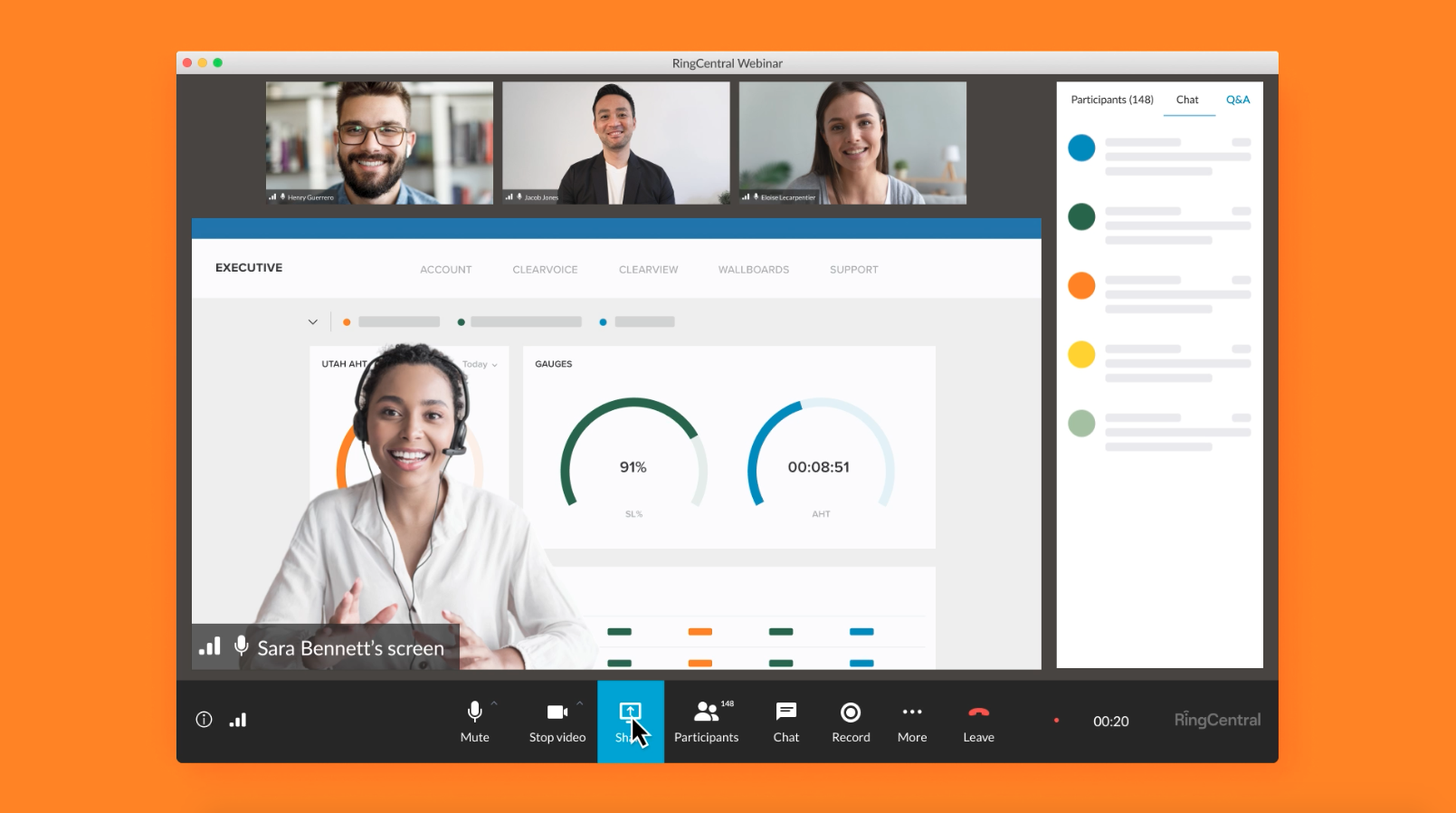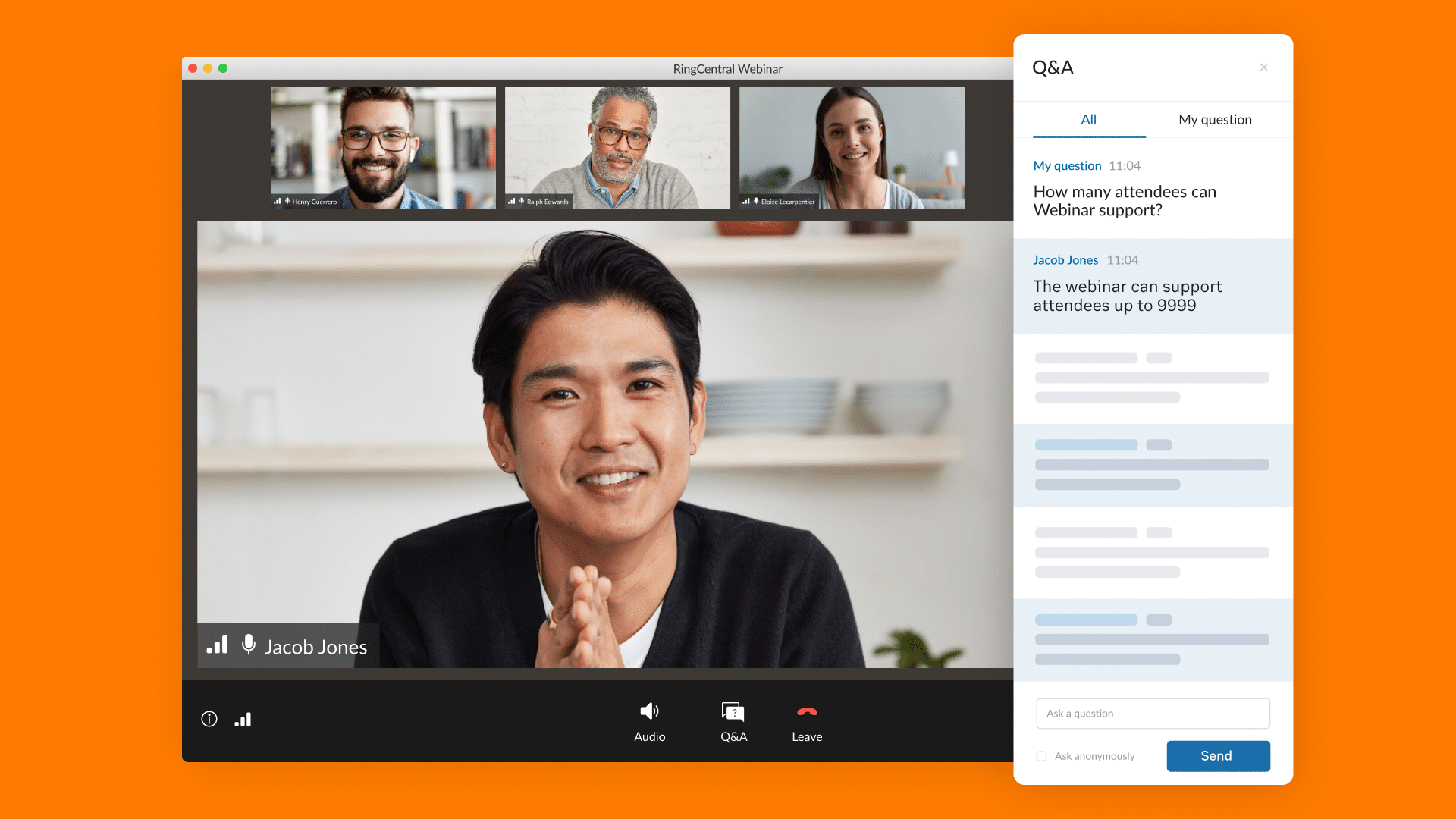Establishing a strong event sponsor strategy is often the key to a successful event that drives ROI. So it makes sense to get this aspect of your event planning right.
But what if you’re planning to host a virtual or hybrid event? Does it still make sense to find and partner with sponsors? If so, what does this kind of arrangement look like? And how do you develop a best-in-class event sponsor strategy for virtual and hybrid gatherings?
We’ll answer all of these questions and more in this article.
In this post, you’ll learn:
What is virtual event sponsorship?
How event planners benefit from virtual sponsorship
How exhibitors benefit from virtual sponsorship
How attendees benefit from virtual sponsorship
How to build a sponsor strategy for virtual and hybrid events
What is virtual event sponsorship?
Virtual sponsorship of an event can take many forms.
For example, sponsors can pay to have their logo added to event registration and event access pages, which helps promote their brand to attendees. They can also sponsor specific workshops and/or sessions during an event to gain brand exposure.
And we can’t forget about sponsored swag. Some events offer sponsorship packages that include physical swag bags event planners send to virtual attendees.
But when it comes to online event sponsorship, the virtual expo hall is one of the most popular options.
A virtual expo hall is similar to expo halls you see at most live, in-person events. Sponsors pay for a booth, from which they can engage event attendees, answer questions, and demo products. The only difference is the booths in a virtual expo hall exist only online.
Whether you plan to host a fully virtual or hybrid event, virtual sponsorship is advantageous. In fact, every participating party, from event planners to exhibitors to attendees will benefit.
How event planners benefit from virtual sponsorship
Virtual sponsorship packages allow event planners to host more sponsors because they aren’t limited by physical space. You can fit as many booths as you want in a digital room.
Because of this, event planners are usually able to drive more sponsorship revenue by hosting virtual and hybrid events than they can by hosting live, in-person gatherings. Since many events rely on sponsorship dollars to turn a profit, this is a huge benefit.
How exhibitors benefit from virtual sponsorship
Exhibitors, also known as sponsors, benefit from virtual sponsorship packages as well. One of the biggest advantages is the extended reach that virtual and hybrid events provide.
If you host an event and book a venue with a 1,000-seat capacity, the companies that sponsor your get-together will only have access to, at most, 1,000 attendees.
But if you host a virtual event, or turn your in-person gathering into a hybrid event, you can host tens of thousands of attendees around the world, which means your sponsors will be able to showcase their respective brands and products to a much larger audience.
In addition, virtual sponsorship opportunities allow exhibitors to engage with attendees in a variety of ways. Sponsors can video and text chat with event guests, easily show them videos, and request their contact details.
Lastly, virtual and hybrid events enable sponsors to accumulate deep attendee insights that simply aren’t available for in-person events.
For example, if the sponsorship package a company buys includes event data, they’ll be able to learn which sessions attendees enjoyed most, how long they watched them for, what their engagement levels were, and more. They can then use this information to inform and help improve their marketing and sales efforts in the future.
How attendees benefit from virtual sponsorship
Can attendees benefit from virtual sponsorship, too? Absolutely!
Because event planners can host more sponsors during virtual and hybrid events, those who attend these gatherings will be able to connect with more people and engage with more companies. Not only that, they’ll be able to interact with people and businesses in whatever way they prefer.
For example, virtual attendees can ask sponsors questions via text or video chat, view live product demos or watch pre-recorded ones, give companies feedback on products and services, or simply enter a booth and observe what’s happening inside.
How to build a sponsor strategy for virtual and hybrid events
Virtual sponsorship is valuable for all involved. The question is, how do you build a sponsor strategy that actually works for virtual and hybrid events? Follow this six-step process to create a winning virtual event sponsor strategy:
1. Invest in a virtual event platform
Without a virtual event platform in your company’s technology stack, you won’t be able to build a satisfactory virtual expo hall for your sponsors to set up shop in.
A virtual event platform is software that allows event planners to host interactive online and hybrid events, such as conferences, seminars, workshops, and more. Think of these platforms as the digital equivalent of physical venues such as hotel ballrooms and conference centers.
Virtual event platforms like RingCentral Events enable hosts to add virtual expo halls for their events, where sponsors can set up digital booths and engage with attendees.
When investing in a virtual event platform look for the following features:
- Multiple spaces: The tool you use should allow you to create multiple virtual spaces, such as large “rooms” for sponsors to demo their products for attendees, small “rooms” to host breakout sessions, and private “rooms” for networking purposes. This will help you give your virtual and/or hybrid event a more in-person feel and create movement and momentum for sponsors and attendees alike.
- Engagement tools: Audience participation is essential to your event’s success. Top-of-the-line virtual event platforms will feature tools slated to drive high engagement, like video Q&As, polls and surveys, direct messaging options, and other integrations that support interactivity. Each of these things allows attendees to engage with event hosts, sponsors, and even other event guests in real time.
- Branding options: The virtual event platform you invest in should give you and your sponsors the ability to customize branding. Choose a solution that allows you to add brand logos, include chosen imagery, and otherwise make your virtual and hybrid event spaces reflect your company’s unique look and feel.
Sign up for a free demo of RingCentral Events to explore the possibilities for your event sponsors and see if it’s the right virtual event platform for you.
2. Offer multiple event sponsor levels
Once you’ve chosen a virtual event platform that will allow you to host sponsors online, redirect your attention to the specific sponsorship packages you’ll make available.
We suggest offering multiple packages, each listed at different price points and equipped with different benefits. That way potential sponsors have options and can choose the package that fits their unique needs and budget. For example, you could offer:
- The Bronze Package – $2,000: Your company logo on all event marketing materials, a dedicated digital sponsor page on the event website, 60-second promotional video before a keynote speech, and a booth in the virtual expo room.
- The Silver Package – $4,000: Everything in the Bronze Package, plus one sponsored session of your choosing. (First come, first serve. Only 25 available.)
- The Gold Package – $5,000: Everything in the Bronze and Silver packages, plus a branded virtual lounge and/or networking session. (Only 15 available.)
In this example, because sponsors receive more benefits with the Silver and Gold packages, you might be able to entice companies to spend more money using a similar tiered sponsorship strategy.
3. Secure sponsors for your event
Now that you’ve selected your virtual event platform and created multiple sponsorship packages, it’s time to identify, invite, and secure sponsors for your event. Ask yourself these three questions:
- What kind of event am I hosting? Consider the type of event you have planned. Is it a large-scale conference for software designers? A small kickoff for sales professionals? Understand what you’re planning and what makes your event unique.
- What type of companies will be interested? Once you understand what your event is and why your target audience will want to attend, identify potential sponsors who serve this group of people. It doesn’t make sense to contact brands outside this scope.
- How do I connect with these brands? Lastly, figure out how to contact the companies you believe will want to sponsor your event. Sometimes a simple phone call will do the trick. Other times you’ll need to connect with a specific individual on LinkedIn. Put on your detective hat and dig up the contact details you need.
When a company agrees to sponsor your event, send them a contract to make your partnership official. This is so important. You may be passionate about the gathering you’re planning and casual conversations you’re having with potential exhibitors, but your relationship with sponsors should still be conducted in a professional way.
Pro tip: Remember, when hosting a virtual or hybrid event, your expo hall isn’t limited by physical space, which means you can partner with a high volume of sponsors. Take advantage and contact as many companies that fit your target profile as you can.
4. Instruct sponsors how to operate virtually
Virtual sponsorship is a relatively new concept. As such, many of the companies you partner with will need to be instructed on how to operate their virtual booths.
How do they log in during the event? How do they engage with attendees? Can they video chat with them or is text communication the only option? Are they able to play pre-recorded product demo videos? If so, how do they do it?
These are important questions and sponsors will want to know the answers. We recommend creating downloadable guidelines, tips and other materials sponsors can refer back to when needed. We also suggest having a technical support team on call that sponsors can contact if they’re having trouble interacting with attendees or using your virtual event platform in any way.
In fact, having a tech team sponsors can interface with could be a perk you promote to potential partners. Who wouldn’t appreciate that kind of support?
5. Ask sponsors to help promote your event
In order for your virtual or hybrid event to be successful, people have to attend, which means you need to promote your event to your target audience. But you don’t have to do it alone. Ask your sponsors to help. After all, it’s in their best interest.
Make it easy on your sponsors and send them a promotional toolkit they can use to market your event to their own audiences. Your toolkit should include:
- A press release: Every promotional toolkit should have a press release so that your sponsors’ marketing teams understand what your event is about and can help promote it in the right way. As an added bonus, sponsors can send the document to their media contacts to help publicize your event on a larger scale.
- Company information: Include information about your brand—what it does, when it was founded, notable achievements, etc. That way sponsors can promote you––as well as your event––when they market your event to their audiences.
- Event information: You should also send information about your event, of course. Include details like keynote speakers, session topics, entertainment options, the URL for your event website, and anything else that might interest a potential attendee.
- Media attention: Has your event gotten any media attention? Send newspaper, magazine, and blog articles that feature positive stories or listings about your event. Attention from any kind of media outlet will add weight to your gathering.
- Creative assets: High-quality pictures, event logos, brochures, and other digital creative assets should be part of your promotional toolkit, too. These materials will make it easy for sponsors to post about your event on their blogs and social media profiles.
6. Follow up with sponsors post-event
Just because your event is over doesn’t mean your work is done. Follow up with sponsors via email after the event to thank them for participating, and to share important details with them regarding the way attendees engaged with their booths.
You might also need to send them lead information––valuable prospect details that could help them generate sales––if this is part of your agreement.
Don’t forget to take a look at the data yourself. By analyzing your sponsorship revenue, you can improve your sponsor strategy for future virtual and hybrid events. Use what you’ve learned to make sponsoring your events a more valuable experience for all involved going forward.
Conclusion
Virtual sponsorship will enable you to partner with more sponsors and, in turn, increase the revenue you generate from your events. Sponsoring online events also opens up new opportunities––like wider reach and digital engagement methods––exhibitors and attendees because both parties are free to interact in a variety of ways.
Looking for a virtual event platform to support your event sponsor strategy? Platforms like RingCentral Events offer plenty of sponsorship tools such as tiered packages, virtual expo booths, and more.
Get a free demo of RingCentral Events today.
Originally published Sep 01, 2022, updated Oct 20, 2024





